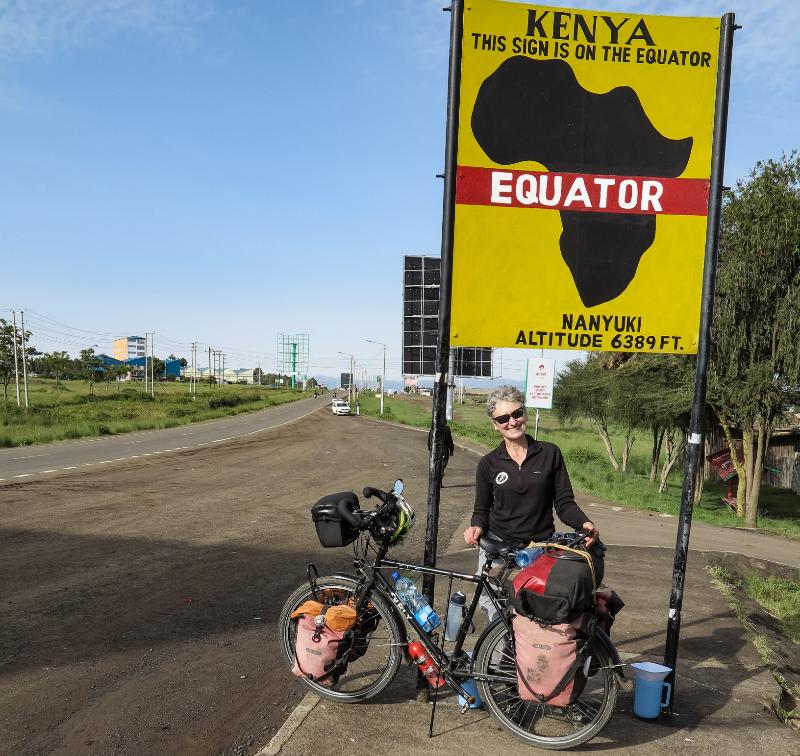
By the time I got to the Guesthouse I was cursing myself. Why on earth did I buy that half a kilo of sugar? As I was paying for it I already knew that I didn’t need it because the day before I had bought some honey from one of the women selling it by the roadside.
My panniers were already heavy enough with all those just-in-case things I have with me. Why do I carry so many just-in-case things? Is it my attempt to live this nomadic life by the standards of my sedentary life? or Is it my way to make ordinary this extraordinary journey? or do I need all those things to feel safe?
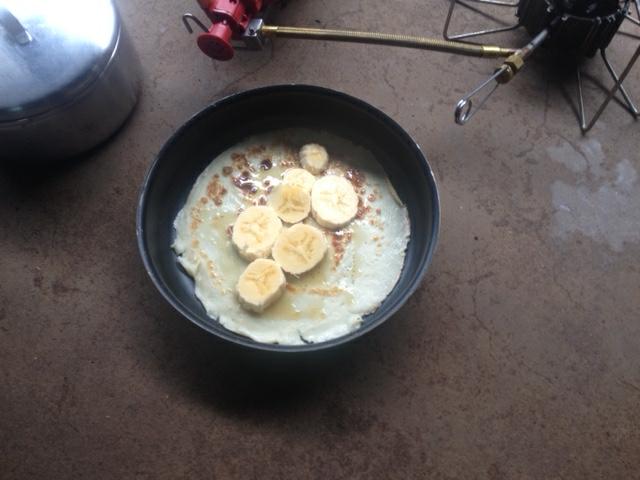
It was quite clear that I didn’t need to carry so much food in a country like Kenya where there are small roadside stalls and shops everywhere selling everything I need for my daily living, not to mention the cafés with cheap, delicious stews and milky sweet teas that I have become addicted to.
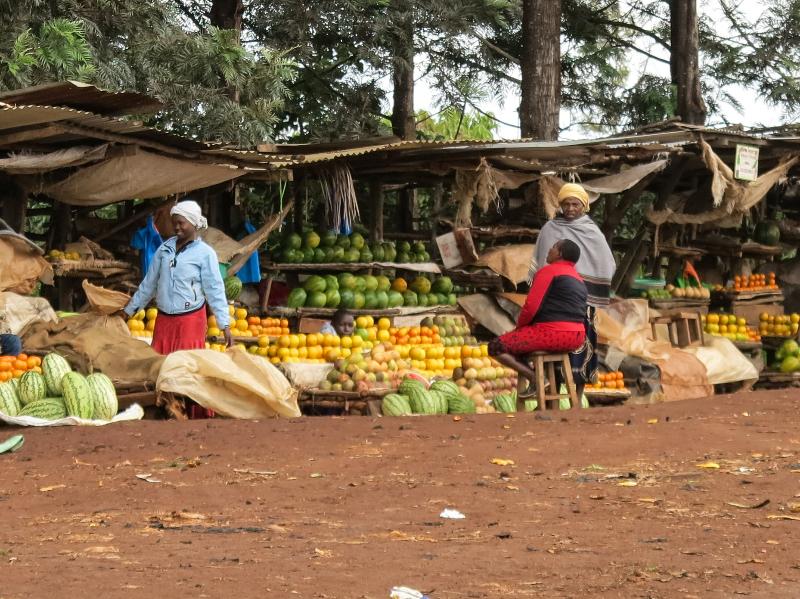
After Ethiopia, Kenya felt like a rest. The contrast between the two countries was staggering. From the moment I crossed the border I entered a different world where people helped you with a smile and didn’t ask for money, children waived as I went by shouting “mzungu” (white skin) and the prices remained constant.
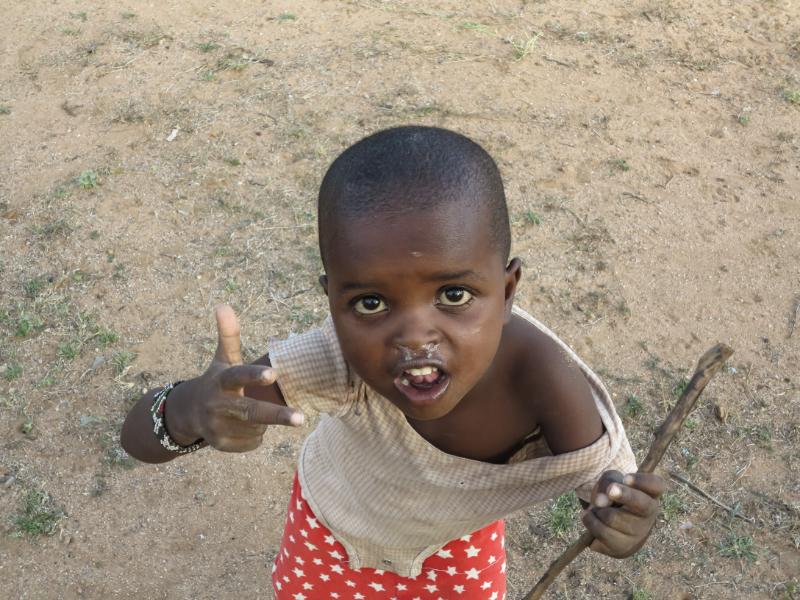
One thing that strikes you right away about Kenya is how clean it is. Plastic bags were banned nearly a year ago with strong penalties to those disobeying the ban. The results are incredible, the roadside is clean, there are no plastic bags flying on trees, there are no more ‘flying toilets’ (people used to defecate in a plastic bag, tied and knot and and then threw it away) and people talk about how plastic is bad for the environment. I wish more countries followed Kenya’s lead.
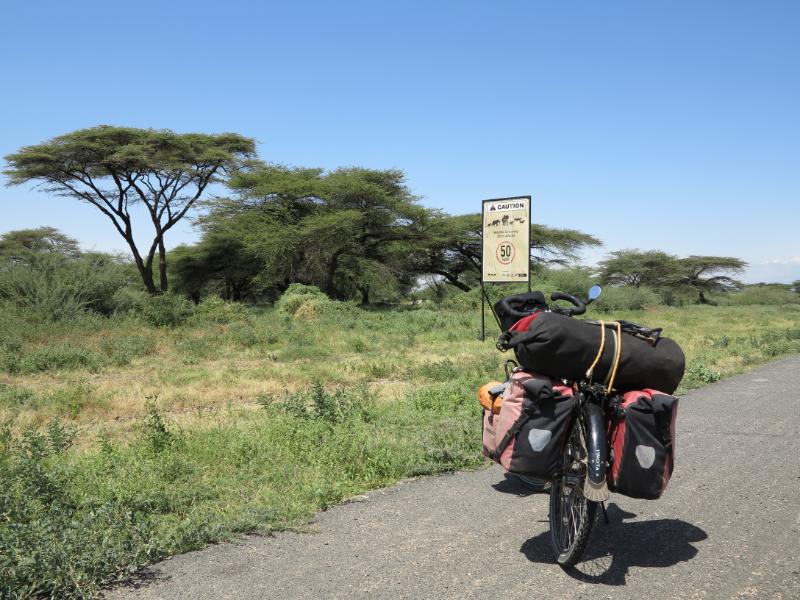
Although roads are clean, the same could not be said of some guesthouses that looked seriously dodgy, particularly in small villages. When I felt my health would be better served by staying in my tent, police posts and police stations became my default camping spots. Their hospitality was fantastic. I was always received with a smile and given water to cook and wash with and in a couple of occasions they even gave me an empty room to sleep in.
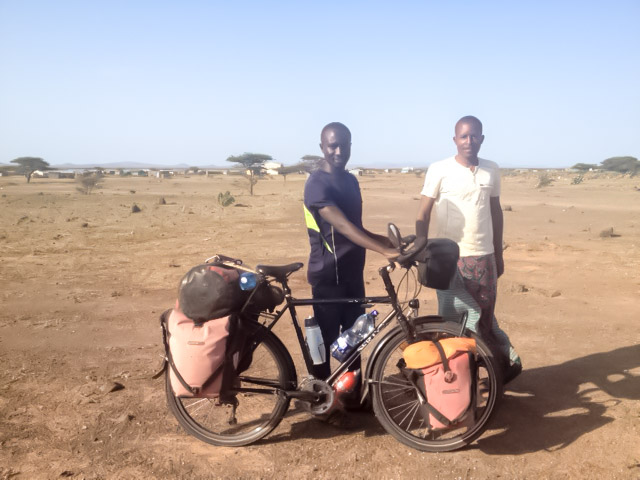
Police posts provided continuity to the changes in landscape and people as I crossed the country. In the North I was struck by the traditional costumes of the Samburu people and their colorful jewellery. Sheperds would come onto the road dressed in full regalia with big machetes hanging round their waist and looking quite fierce as they demanded water, sometimes quite aggressively. I learnt to scan the scrub for livestock and listen carefully for the sound of the bells around the cattle’s neck. I would then get ready to throw one of the small bottles of water that I carried in my handlebar bag as soon as I saw the sheperds coming towards the road and quickly make my scape.
In Samburu county I went to Umoja Women’s Village, a women only village set up 28 years ago to provide refuge to women victims of domestic violence, rape and female genital mutilation. The women make their money by selling traditional jewellery and by running a nearby campsite. They used to have cows but after the village got raid by cattle thieves it became too dangerous to own animals and now they have none.
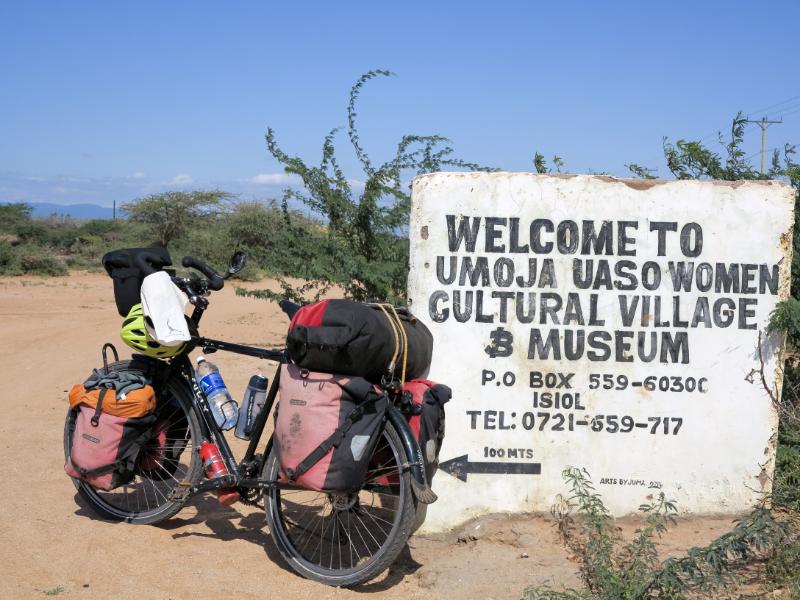
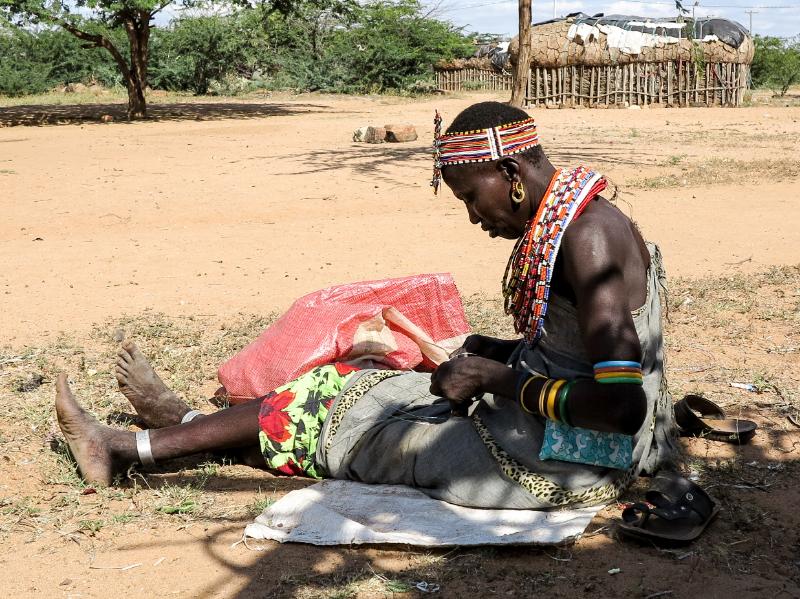
I stayed in one of the village huts. The hut was built with sticks and dung and had some plastic sheeting in the roof for waterproofing. It was very dark inside and at night small coppery crockoaches took over the place. It was sobering to experience the environment in which these women live and to be invited for tea at Rose’s hut and see how little they have and how they live one day at a time buying enough sugar and tea for that day. They don’t need just-in-case things, for them safety is about being together, away from their abusers.
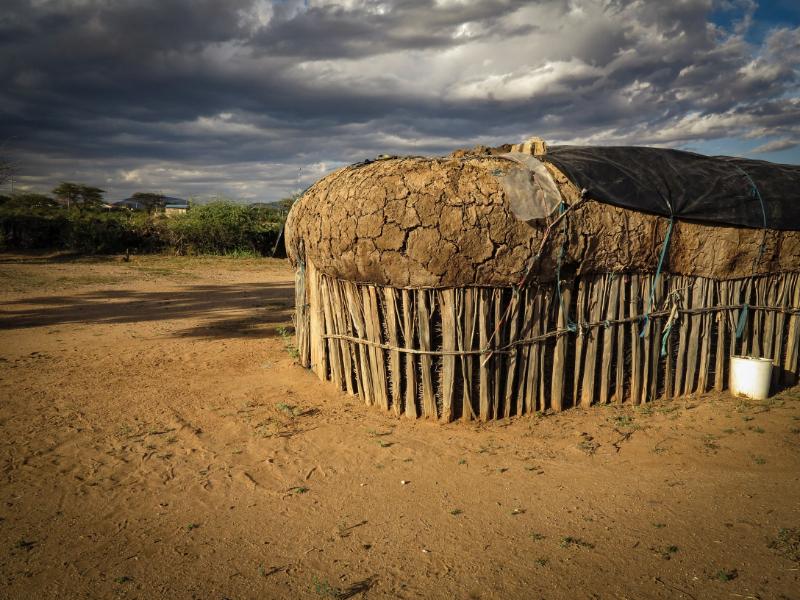
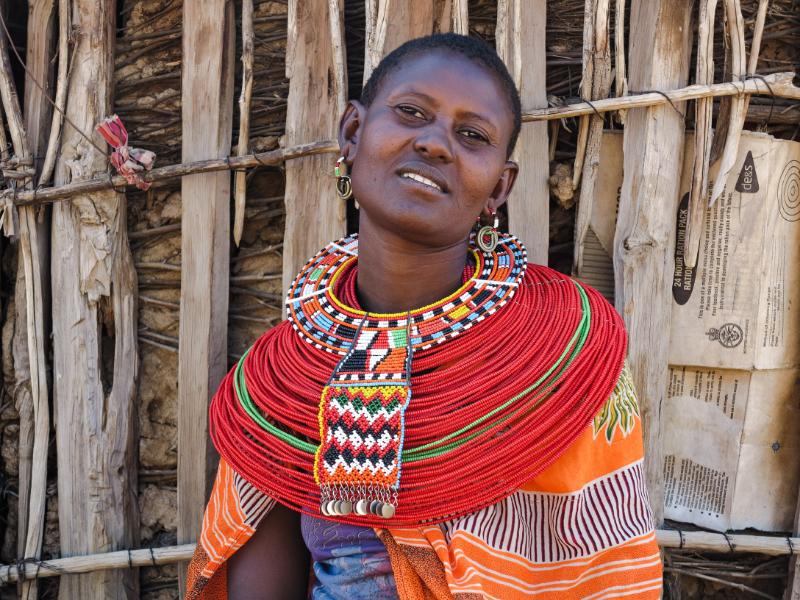
The meaning of what it means to be safe came up again to my mind during a big climb towards the Equator, in an area with huge farms protected by electrified fences and a tea shop that would be perfectly at home in Kent whilst marginal farmers grow potatoes and corn in the barely five meters that separate the road from the electrified fence. That small piece of land where they could grow food was their safety.
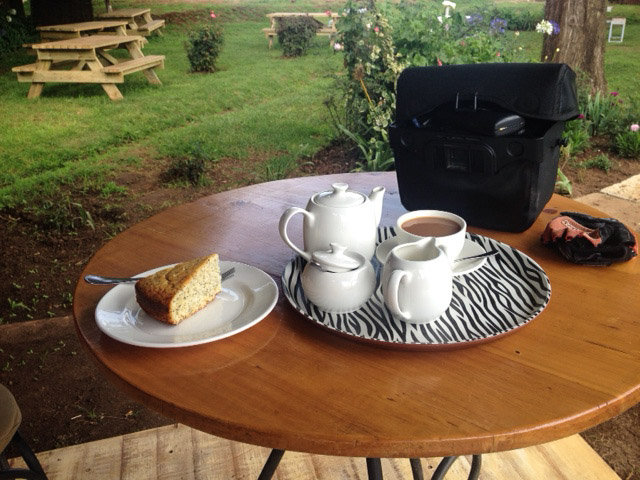
By the time I got to Nairobi something had shifted inside me, I relaxed and trusted that the road would meet my needs – a small cafe would appear at the right time, a place where I could pitch my tent, company when I needed it.
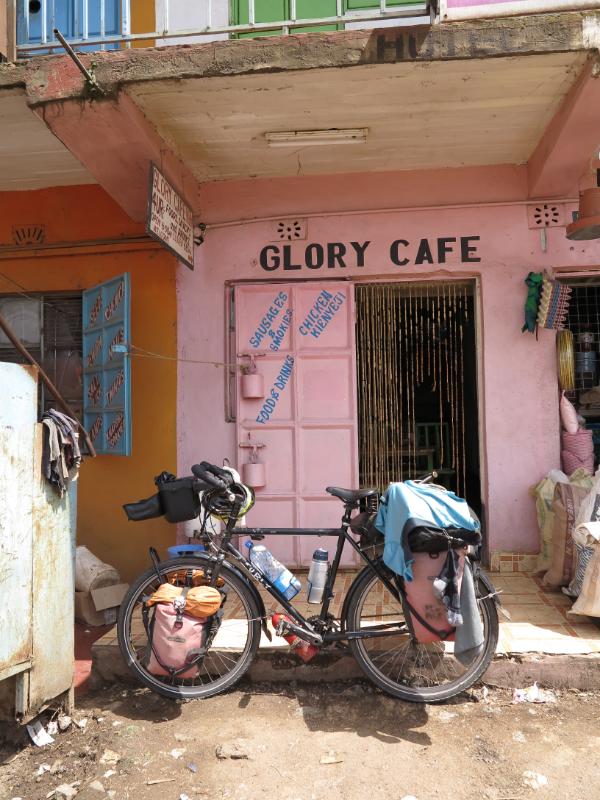
And it did! It was really nice to meet Guy again at Jungle Junction, a well known overlander campsite in Nairobi. Guy is travelling from London to South Africa on his motorbike and I had met him twice before, the first time in Gonder and the second in Addis. He was the one that saved the day by giving Amaya a lift to the airport on his motorbike when it was apparent that a taxi would not materialise.
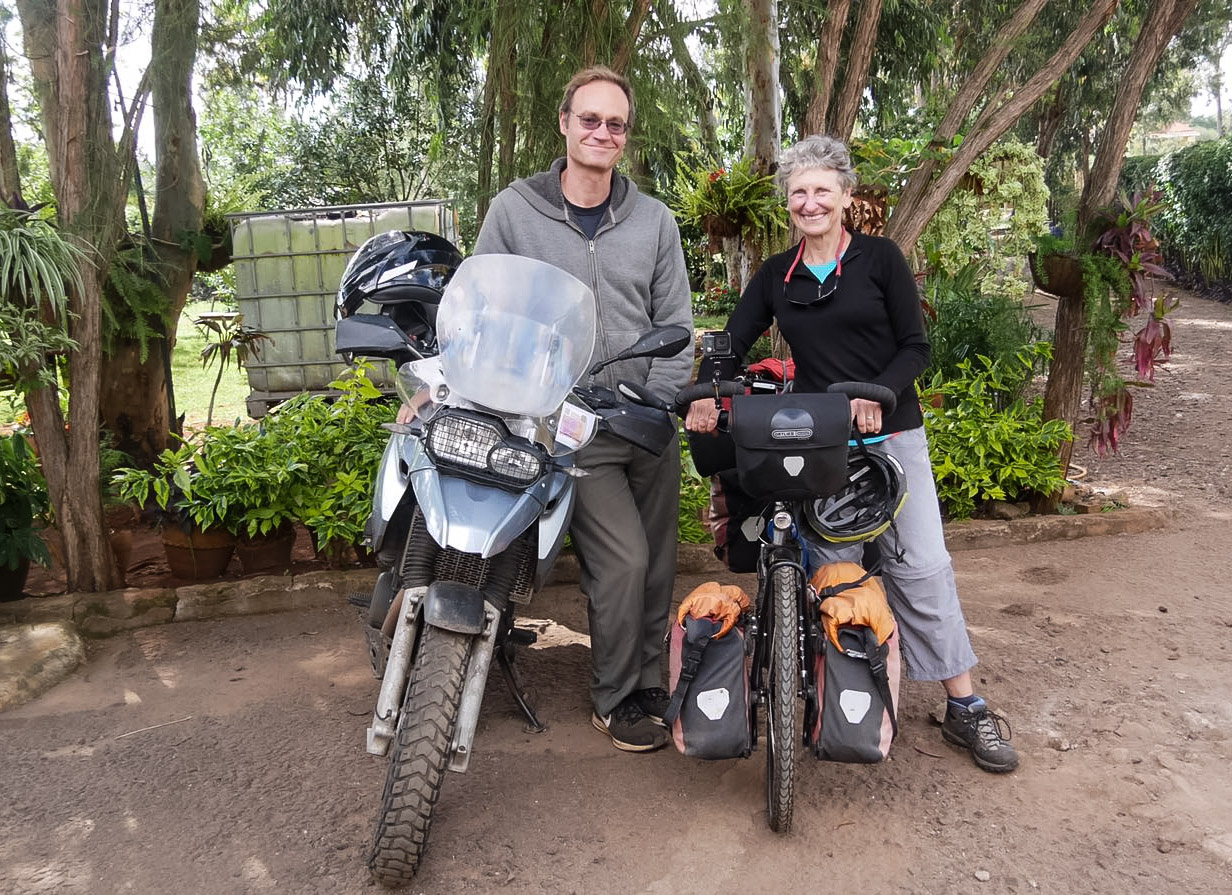
It was bliss doing all those ordinary things that normally I do by myself with someone else without cultural or language barriers: deciding what to have for dinner, shopping, ordering take away pizza and cooking together. I was tired and needed some down time and when best to have it than when there is good company.
By the time Ieft Nairobi I was re-energised and when round a corner I was regaled with the most amazing view of the Great Rift Valley I had to stop to take it all in. The view was breathtaking but it was the realisation that I was in Africa, in the Great Rift Valley that was joyful and overpowering.
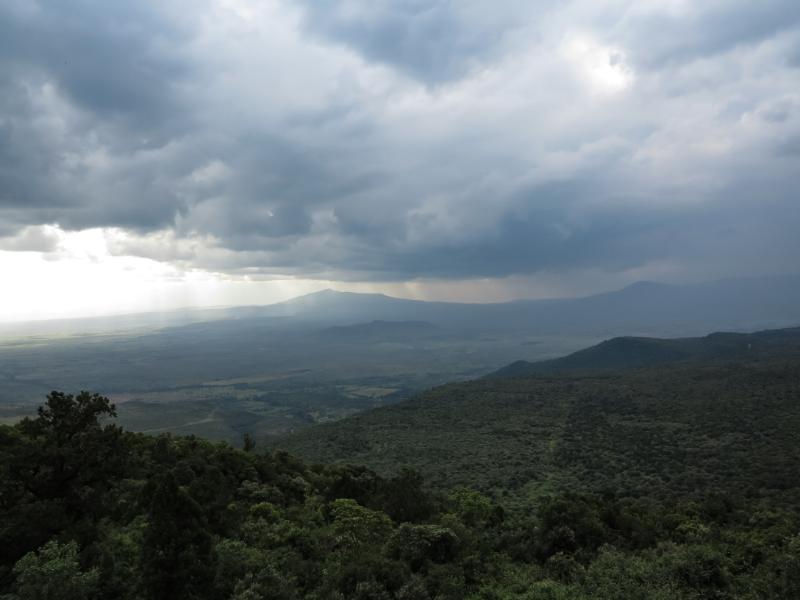
The next few days were filled with the same childlike joy especially at Kilimandege House, the place where Joan Root, the film maker and conservationist, lived and died. Sitting in her baranda at dusk I saw giraffes, hippos, zebras, water bucks, dik-diks whilst in the day monkeys came into the kitchen to steal bananas.
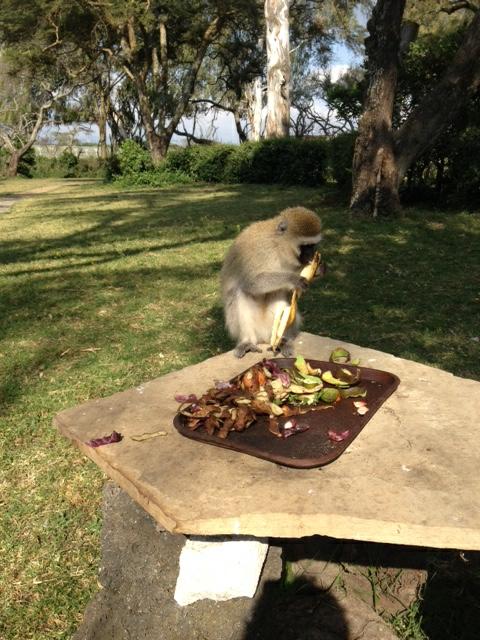
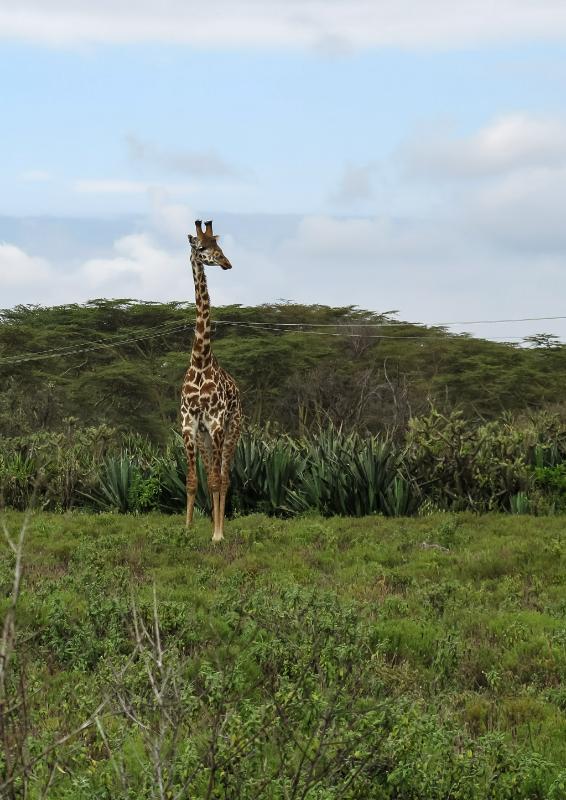
Kilimadege House is a magical place where the animals roam freely without the restrictions of electric fences. The house is being lovingly restored by Joseph and is an oasis of peace. It was very special to see Joan’s bedroom where she was murdered for her commitment to conservation but also where dreams and plans for the wonderful films she created with Alan Root were born.
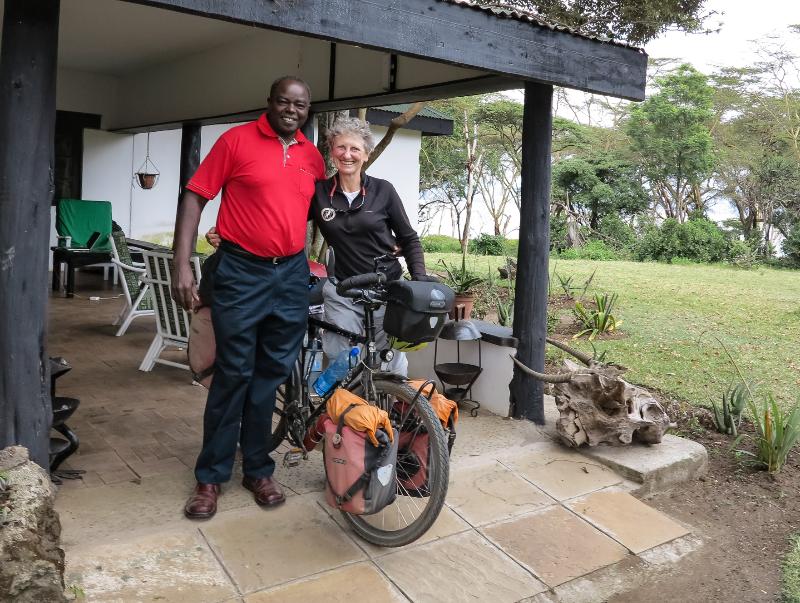
Maybe it was my new state of mind but things just got better and better – a meeting with Asier, another basque cycling in this amazing continent, pink flamingos in Lake Bogoria, majestic acacia trees, camping in a school where the girls were totally amazed by the whiteness of my feet and kept on touching them, the beauty of Kerio Valley, spending time with the Cheptebo community, dancing on the road with an older woman selling bananas, talking politics with a widow-mango-grower…
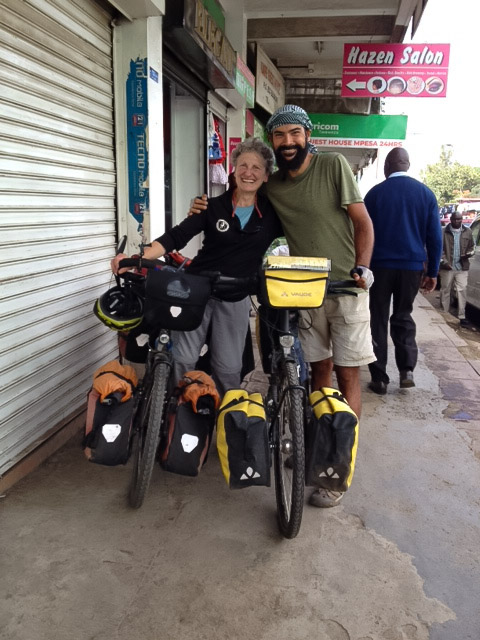
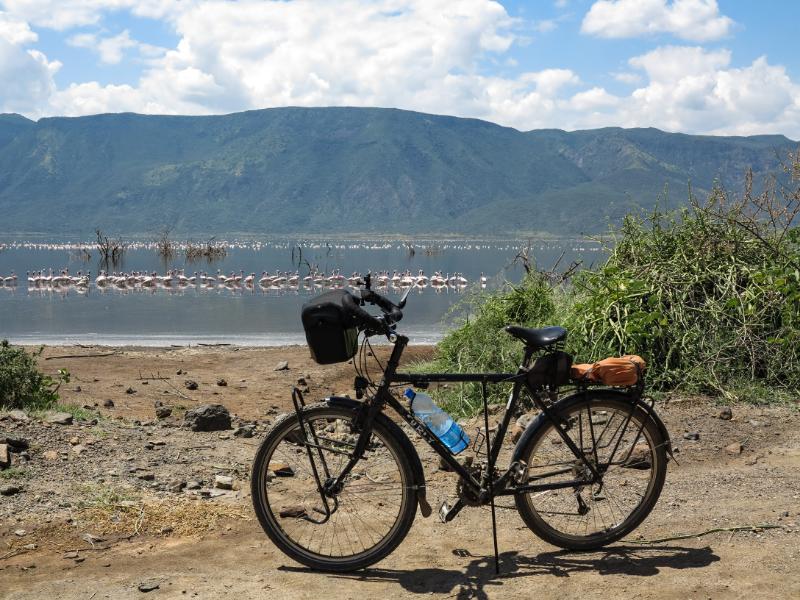
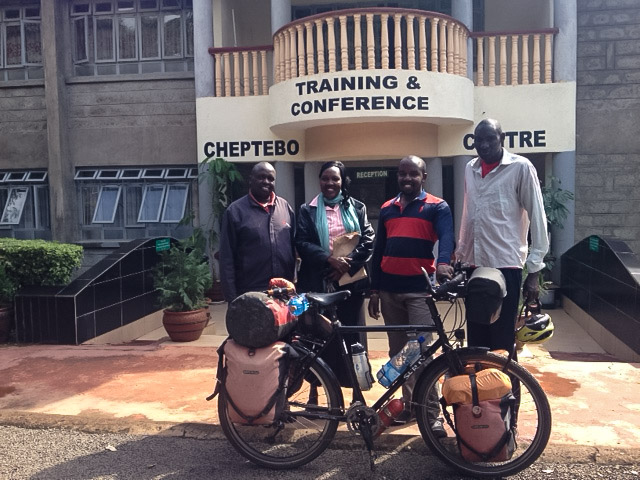
As for the bag of sugar? I hope it is being enjoyed by the old man to whom I gave it to after he helped me push the bike for a few meters in a particularly steep stretch of road.
What a beautiful story! I enjoyed it very much! Keep going strong! Love from Jef
Hola Txuri, me alegro un montón de esta experiencia tan gratificante. ¡Ya tocaba! Ha sido un relato precioso, muy humano como siempre y de los que se leen con una sonrisa en la cara. Espero que te dure mucho el efecto.
Me ha encantado que encontraras sentido al paquete de azúcar. Al final del viaje haces un recuento de lo que no hayas utilizado nunca y seguramente verás que el “just in case” ha sido muy útil.
Un abrazo muy grande
Mariló
Wonderful evocative tales as ever, Blanca. Seems we could all learn a lot about plastics and women surviving male violence, from Kenya. But I’m constantly amazed at how you stay so positive in the face of machete-wielding cattle herders and all, just lobbing water in their direction and pedaling away. Hope your time in Uganda is peaceful and wonderful.
Txuri….
Qué recuerdos me ha traído tu relato. Mi viaje a Kenia con toda la familia ha sido el mejor de todos los que he hecho. Me alegro mucho de que estés en un país tan maravilloso…. Disfrútalo!!
Un abrazo enorme.
love the way you write up your adventure. so happy you can share your photos.
Hola Preciosa!!!
Qué maravilloso viaje!!! Estamos amando Africa y sus.gentes de la mano de tus relatos.y de las.sonrisas.que iluminan tus.fotos!!!
Un.abraxo muy fuerte fe Abraham y mío!!!
Besos y cuidate y disfruta!!!
Really enjoying your blog Blanca. I have travelled many times to both Ethiopia and Kenya on business. I always found Ethiopia charming, welcoming, cheap, beautiful. And my memories of Kenya are of a much more dangerous country. It’s amazing now reading of your 2 experiences, so different at the ground level. Fascinating. I wish you all the best from sunny sunny Ireland. Un beso,
Hi Blanca! Well its 11.07pm in the UK as we write this, and we were so warmed by reading about your wonderful experiences. Looks like you are having another amazing adventure!! 🙂 We are sending our love and best wishes to you xxx
What an amazing woman you are- continuing your amazing adventures. Wonderful to see and hear, tho it’s as much about what you don’t write as what you do. We are so lucky to have all we have – and mostly don’t need. Your account of the Women’s Village is salutary. Hope you continue to keep safe and happy dearest Blanca xxx
Amazing reading Blanca, and your photos are stunning! x
Wow – what an utterly rich journey you are having. Can’t believe the lack of blue trees and the change since I was there. If they can get their act together we really should be able to achieve the same results. People continue to give in humanity and how wonderious to be able to breath in all that Africa is offering up to you xxxxx
Hi Blanca, you write so beautifully and your stories are enchanting and amazing! I don’t get time to read as much as I’d like but SO glad I read this one. Safe travels – I hope you will publish these soon and I can buy your book and read it from end to end whilst on holiday!
Fabulous post Blanca, prose and photos. It made me think of a colleague who dedicated countless hours since 2000 to supporting young Kenyans. She was a public health nurse who first spent all her vacations going to Kenya and then many months a year when she retired. One of her major projects was providing goats to HIV+ women and apparently many goats and children in Kakamega are named Marie in her honour. She and others in my hood started the Kenya Education Endowment Fund http://www.kenyaeducation.org and she always brought jewelry (just like in your photo) back to sell at my workplace to contribute to the fund.
Looking forward to your next installment. xxoo
I love reading your blog Blanca. What rich experiences even if they are scary sometimes. Take care and much love xxx
Wow, Blanca, Thank you for encouraging me to cycle in Africa in the future after I finishing the Americas.
Heike
Wow Blanca, it sounds wonderful, and such a change from Ethiopia!
It’s amazing that the banning of plastic bags has had such an effect so quickly, and great that Kenya is leading by example. Wonderful also to hear about Umoja, and the way that the women are able to support each other and have created a sustainable community.
Looking forward to the next instalment!
Loads of love
Kath xxxx
Hi Blanca,
Thank you for keeping us up to date with your travels. It’s great to see the blue and orange markers on the map and learn about the countries.
Your lovely smile and personality must make your journey a joy for you and for those you meet.
Keep safe and enjoying yourself. I think about you Morten.
Shân xx
What wonderful experiences and tales!!! And I love the just-in-case thoughts, as I’m a real just-in-case collector
Lots of love
Dagmar
Excellent story . Hope you are well . Nigel ( Derby) . Nalerawe ,Uganda. xx